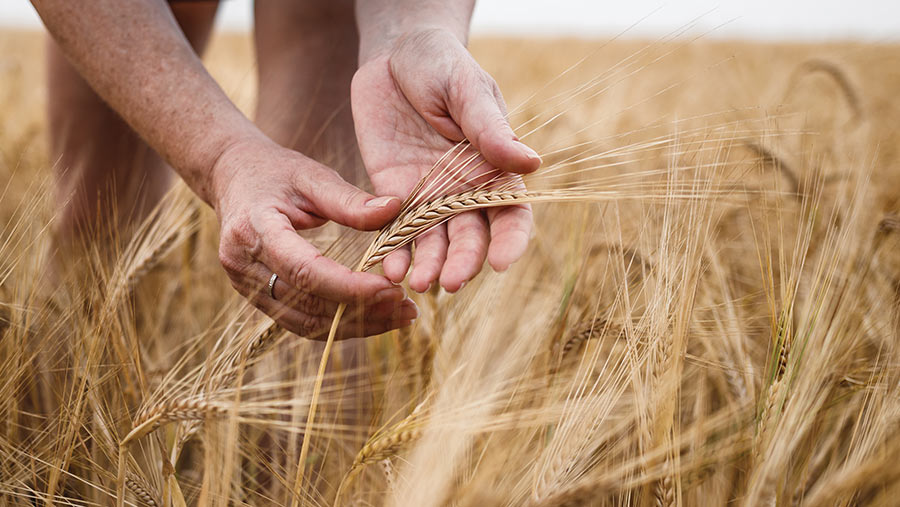What are the job prospects in food and farming?
 © encierro/Adobe Stock
© encierro/Adobe Stock Agriculture and the food supply chain remain major employers in the UK, with 462,000 people working on agricultural holdings in 2023, according to Defra’s June census.
But cast the net wider, and it is apparent that the wider agri-food sector – including agriculture, manufacturing, wholesaling, retailing and catering – actually employs more than 4 million people, accounting for 13.4% of total GB employment.
See also: Agriculture careers inspire the next generation
Farmers Weekly spoke to Stuart Goodinson, managing director of agricultural recruitment firm De Lacy Executive, to find out more about the current job market.
There has been a bit of stagnation over the past few years, at all levels of the career ladder, according to Mr Goodinson.
This is due to a number of issues including the impact of Covid-19, but probably more to do with Brexit, with fewer workers available for base-level roles.
It has made it more difficult for workers at the start of their careers to progress, as businesses have still needed those people at “ground level” performing those more basic tasks.
He has also noticed a bit of stalling at the more senior end of the jobs market too, due to pensions not performing as well as hoped for, and the cost-of-living crisis causing people to carry on in their jobs.
“I think we’ve seen senior managers maybe staying on in their roles slightly more than they would have done if the economic climate had been slightly better,” he said.
New opportunities
However, there are some changes starting to come through, with 2024 looking slightly more buoyant than 2023.
A few more job openings are expected, especially for more senior management, sales and training roles, as companies are ready to scale up again.
“With inflation and interest rates looking more predictable, there is slightly more stability,” said Mr Goodinson.
“Companies are seeing a more stable financial market going forward, so plans that may have been put on hold during the past year or two are now starting to take place.
“We saw quite a lot of downsizing and restructuring in 2023, but we are seeing new strategies coming into 2024 because of that economic stability.”

© Adobe Stock
How much are people paid in agriculture
Weekly earnings for agriculture, forestry and fishing sector workers averaged £492 in October 2023 – an increase of 10% on the year, according to provisional estimates by the Office for National Statistics.
This compared with average weekly earnings of £619 for regular pay across the whole GB labour market in October.
A survey conducted by the Institute of Agricultural Management (IAgrM) found the average annual salary of UK farm managers was £53,306 in 2022.
What employers are looking for
When it comes to matching people with vacancies, companies will often look for someone who is enthusiastic, a “go-getter”, self-motivated and understands their subject, says Mr Goodinson.
What makes somebody succeed in a company more than anybody else is when the company culture matches the personality of the individual.
For example, if there is someone who really enjoys working in close collaboration, enjoys creative work and helping other people, then working for a company that is all “sell, sell, sell” and moving product will result in a culture clash.
“My advice is to do a lot of research, not only on the culture you like, but also the culture of the companies that you might like to work for.”
He also advises that having a university degree is not essential for many jobs in agri-business, but having a basic understanding of farming is still often a sought-after trait by employers.
“While degrees might help you get on the ladder, experience and attitude still outshine qualifications every time.”
Finding the right job for you in agri-business
- Find something that you get job satisfaction from. The best job is the one that you really enjoy doing and pays the bills
- Write a physical list about the bits you enjoy and don’t enjoy in your current job
- Look around all the time at what jobs are available, reading through the job descriptions to find one which matches your interests
- Speak with recruitment consultants to get some indicators on what might be right for you
Higher earners
For people motivated by good earnings, senior agronomists, senior traders, and those in sales roles tend to occupy some of the higher paid positions within agriculture.
Stuart Goodinson said: “If you want to make money in your career, in my view you want to use sales. People who are making the most money have been involved in sales at some stage in their career.
“The reason is because, if you are a good sales person, actually you know how to manage people, you know how to understand your product, and you have to be commercially strong.
“Being a good sales person means you have what you need to progress.”
How much are the leading companies earning and paying?
Farmers Weekly has produced a table showing the number of employees, their average salaries, company revenue, and pre-tax profits at some of the largest agricultural companies in the UK. .
All of the information collated in the table uses information made publicly available by Companies House and the Mutuals Public Register.
Time periods covered vary between companies due to when accounts were filed.
The sample considered a wide mixture of organisations, including grain traders, processors, and machinery dealerships.
Average salaries of the companies included in the sample ranged from £20,000 to £65,000, with traders generally up toward the higher end of the scale.
This big range in salaries reflects the diverse range of job roles, some with traditionally higher pay than others, while some other businesses will have a large number of part-time or more retail-focused staff.
The highest paid director in each of the companies listed earned on average roughly 10 times the amount of its average employees.
The median annual pay for UK full-time employees was £33,000 for the tax year to 5 April 2022.
Who are some of food and farming’s major employers’ please
Who are some of food and farming’s major employers? |
|||||||||
| Company | Nature of business | Number of staff | Total staff wages and salary* | Average salary | Revenue | Pre-tax profit / (loss) | Highest paid director emoluments | Multiple of average staff salary | Financial year end date |
| Cranswick | Meat processor | 10,422 | £335,900,000 | £32,230 | £2,323,000,000 | £139,500,000 | £751,000 | 23.3 | 25 Mar 23 |
| Moy Park | Meat processor | 9,296 | £270,067,000 | £29,052 | £1,834,694,000 | £25,644,000 | £1,408,000 | 48.5 | 31 Dec 22 |
| 2 Sisters | Poultry business | 8,187 | £209,878,000 | £25,636 | £1,425,634,000 |
(£93,759,000) |
£3,132,000 | 122.2 | 30 Jul 22 |
| Avara foods | Poultry business | 6,439 | £178,493,395 | £27,721 | £1,262,687,000 | (£16,114,000) | £72,000 | 2.6 | 31 May 22 |
| Muller UK | Milk processor | 5,756 | £237,903,000 | £41,331 | £2,332,531,000 | (£5,889,000) | ** | – | 31 Dec 22 |
| Pilgrims Pride | Meat processor | 5,108 | £160,267,000 | £31,376 | £1,167,630,000 | (£12,108,000) | £468,000 | 14.9 | 25 Dec 22 |
| Dunbia UK (Dawn meats) | Meat processor | 4,270 | £120,220,985 | £28,155 | £1,367,464,321 | £15,444,681 | ** | – | 01 Jan 23 |
| Arla foods | Milk processor | 3,722 | £161,364,000 | £43,354 | £3,020,190,000 | £50,139,000 | £581,000 | 13.4 | 31 Dec 22 |
| Genus | Animal genetics | 3,628 |
£198,100,000 |
£54,603 | £689,700,000 | £39,400,000 | £1,210,000 | 22.2 | 30 Jun 23 |
| Mole Valley Farmers | Agricultural suppliers | 2,057 | £44,817,000 | £21,788 | £615,460,000 | £3,028,000 | £70,000 | 3.2 | 30 Sep 22 |
| AB Agri | Multi-sector agri-business | 1,321 | £72,194,000 | £54,651 | £1,168,963,000 | (£16,876,000) | £1,202,000*** | 22.0 | 31 Aug 23 |
| Kepak Group | Meat processor | 1,300 | £46,897,139 | £36,075 | £570,924,253 | £3,465,595 | ** | – | 31 Dec 22 |
| Frontier Agriculture UK | Arable commodity trader | 1,102 | £52,594,000 | £47,726 | £1,842,540,000 | £39,030,000 | £862,000 | 18.1 | 30 Jun 22 |
| Wynnstay Group | Arable commodity trader | 943 | £32,688,000 | £34,664 | £713,034,000 | £21,124,000 | £492,000 | 14.2 | 31 Oct 22 |
| TH White | Machinery dealership | 588 | £22,783,000 | £38,747 | £173,092,000 | £3,783,000 | £169,000 | 4.4 | 31 Dec 22 |
| Chandlers (farm equipment) | Machinery dealership | 377 | £12,581,000 | £33,371 | £153,590,000 | £3,154,000 | £150,000 | 4.5 | 31 Dec 22 |
| Simpsons Malt | Arable commodity trader | 366 | £17,605,000 | £48,101 | £273,817,000 | £9,536,000 | £732,000 | 15.2 | 31 Dec 22 |
| Pickstock (Telford) | Meat processor | 323 | £9,931,620 | £30,748 | £137,800,00 | £7,960,346 | £147,000 | 4.8 | 31 Dec 22 |
| Scot JCB (Holdings) | Machinery dealership | 301 | £14,989,000 | £49,797 | £204,897,000 | £6,081,000 | £475,000 | 9.5 | 31 Dec 22 |
| Farol | Machinery dealership | 294 | £11,819,000 | £40,201 | £180,518,000 | £6,208,000 | £134,000 | 3.3 | 31 Jan 23 |
| Ben Burgess | Machinery dealership | 288 | £11,248,377 | £39,057 | £143,000,000 | £5,867,000 | £229,000 | 5.9 | 31 Jan 23 |
| First Milk | Milk processor | 220 | £11,318,000 | £51,445 | £456,243,000 | £996,000 | £515,722 | 10.0 | 31 Mar 23 |
| Openfield Agriculture | Arable commodity trader | 200 | £10,074,000 | £50,370 | £669,688,000 | £3,722,000 | £408,000 | 8.1 | 30 Jun 22 |
| Dyson Farming | Major farming enterprise | 187 | £8,253,000 | £44,134 | £35,019,000 | £4,702,000 | £307,000 | 7.0 | 31 Dec 22 |
| ADM Agriculture UK | Arable commodity trader | 173 | £10,000,000 |
£58,098 |
£1,600,000,000 | £4,300,000 |
£430,000 |
7.4 | 31 Dec 22 |
| Cefetra | Arable commodity trader | 156 | £10,221,000 | £65,519 | £1,586,480,000 | £16,213,000 | £475,000 | 7.2 |
31 Dec 22 |
| Velcourt | Major farming enterprise | 137 | £6,249,000 | £45,613 | £23,530,000 | £2,949,000 | £249,000 | 5.5 | 30 Sep 22 |
| Anglia Farmers (AF group) | Agricultural buying group | 124 | £3,873,666 | £31,239 | £285,800,000 |
£839,000 |
£128,000 |
4.1 | 31 Jan 22 |
|
*Excluding other staff costs (social security, contributions and pensions) ** Figure unclear based off files on companies house ***Director emoluments include long-term incentive plans. Information made publicly available by Companies House and the Mutuals Public Register. “Errors and omissions excepted” |
|||||||||
